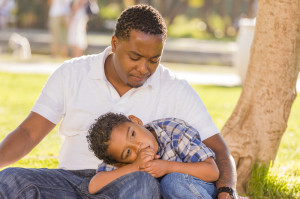In my article, “Children & Grief: What You Need to Know,” we explored the unique characteristics of grieving children. I also shared some of my experiences with grief and how, as a mother, I have been raising my children through grief after we experienced some devastating losses. My experiences have shown me, first hand, the importance of being alert, open and willing to help children through grief. After all, children are likely to take their cues about loss and grief from parents, caregivers, or from whomever they feel closest to.
But even when we want to help them, one of the biggest challenges for parents, family members, teachers, and friends, is often how to help children through grief; it’s tough to know what you can do.
Children & Grief: What You Can Do
The following suggestions will hopefully empower you and give you some ideas of what you can do to help your child through grief and loss. Since children “grow up” with grief, understanding bits and pieces as they develop, some of the ideas may work better for children at different ages and stages. No one solution works for everyone, so it’s important to assess your child’s needs and level of comprehension in order to better understand which options will help the most.
1) Help the child identify his/her losses, both obvious and hidden.
Give your child the words s/he may be lacking. “You’re feeling sad because Mommy is gone, right?” Or, “I think this anger you’re feeling is really sadness ‘cause you miss your brother.” These words help the child identify the “obvious” loss of a loved one. But there are likely several hidden losses too. “Now that Mommy’s gone, Daddy seems different, and that’s scary, isn’t it?” This is a “hidden” loss that may feel even more hurtful than the physical loss, depending on the child’s age. Helping children identify all of their many losses and giving them the words to understand what they are feeling is one of the most important and powerful ways to help them through grief.
2) Let them know it’s ok to feel what they feel.
As I explained in “Dealing with Grief,” there are over 100 possible symptoms of grief—for adults and children. Children may feel numb, sad, hyper, angry, physically sick, anxious, or a host of other things. The important message is that children know it’s ok to feel what they feel. It’s ok to feel sad. It’s ok to feel angry. It’s ok to wish this never had happened. It’s ok to cry. It’s ok to talk about it. It’s hard to feel what you feel, but it’s part of losing someone you love, and it’s ok.
3) Assure them you’re always open and available to talk, cry, hug, or just love them through whatever they’re experiencing.
With children, you don’t always know when symptoms will arise—as I said before, they grow up with grief. But it’s critical to make sure they know you’re open and able to handle it when things do arise. One of my adopted sons was 6 when his mother and father died. He adjusted well after the losses, but I was pretty sure there were deep emotions in him about his losses, even if he didn’t show it or couldn’t really comprehend it. Then one day, out of the blue, as we were driving home from school, he said, “I have a secret.” “You do?” I asked. “Can you tell me? “Nope.” “Is it that your mother and father died?” “Yep.” “Well, honey, I know your secret. And Dad knows your secret. And Mimi and Pop know your secret. And your teachers and your church leaders know too. It’s not a secret to us. So whenever you want to talk about it, we are always here. Ok?” “Ok.” And that was it. Children of all ages need to know that whenever the grief and emotions arise there is someone they can turn to who will listen and love them through it.
4) Help children process their losses.
Most adults are uncertain about how to grieve, and children are no different. Many of the suggestions in “How do I Grieve?: Grief Work & TEARS” can be helpful. TEARS[i] is a method I developed for helping people process the emotions of grief; below are a few suggestions specific for children:
- Talking–Some children want to talk, and many do not. Open ended statements like “Tell me how you feel about that,” can be helpful. Getting them involved in an activity (like playing a sport or game together) can also help them open up and start talking, especially for boys. However, don’t force it; over time they should feel more able talk about what they’ve been through. If they know you’re open and ready, they will come to you when the time is right.
- Exercise & Physical Activity–This can be very helpful for kids who don’t have the verbal capacity or desire to express emotions. Sports and other physical activity can help them work out the emotions in a healthy way.
- Artistic Expression & Recording Emotions–This is especially great for younger children. Make a collage, photo album, or scrapbook of the deceased. Have the child draw pictures of favorite memories. Older children can write a letter to the deceased, expressing what they need to say. Give the child a journal where s/he can write or draw out feelings and experiences. Music can also help–playing an instrument, singing, or creating music in honor of the deceased both helps remember them and helps process emotions physically and emotionally too. Most of my children use the piano, guitar, or drums to “play out” their emotions when they get too high, and it is highly effective.
- Sobbing–Children might not cry as often as you think they should, but when they do, take it seriously. Encourage them to stick with it and let it out. It’s a very powerful way to release the emotions of grief.
5) Keep an eye out for nightmares, bedwetting, school troubles, interpersonal struggles, and depression.
Often grief doesn’t look like grief. These other symptoms may be grief in disguise. It’s common for children to process grief in various ways, especially when they feel overwhelmed by painful emotions and unsure of how to manage them or where to turn for help. Some children may develop problems at school or behavioral problems at home, and some may develop depression. It’s always a great idea, therefore, to be on the watch for these things and seek intervention with a professional if trouble arises.
6) Enlist the help of family and friends to keep an eye on them, use the school counselor, and keep in touch with their teachers.
Because grief in children is often not as immediate or obvious as it is in adults, a big part of the process is keeping an eye on them over the months and years. It’s helpful to involve others in this process, especially if you’re grieving too, but also in order to ensure you don’t miss what’s going on when you’re not around. You may also want to watch their play and drawings to understand how they’re feeling. Kids tend to put it all out into their creative pieces, and it can be a helpful way for parents to see what’s on their mind. One of my sons had a series of drawings from school in which a monkey was climbing the city and was going to bomb it. It gave me an opening to understand his distress and was a great opportunity for me to discuss and process with him how he’d been feeling.
7) Find an adult who can fill the role of “parent” if they’ve lost a parent or if their parent is too overcome with grief.
An uncle who can step in as “dad” or a family friend who can help be a “mother” to the child can help fill that emptiness, either permanently or temporarily. Let the child know that no one could ever replace their parent, but that you’re there for them in the same way.
8) A word about children and trauma.
Loss is traumatic when you’re a child, no matter what it is, but some losses are more traumatic than others. Children who have been exposed to significant trauma may have an even harder time dealing with grief than others. For example, if a child is a survivor while others died, s/he may experience grief symptoms in addition to secondary symptoms of guilt and Posttraumatic Stress, like re-experiencing the event (dreams, flashbacks), numbing or ignoring what happened, and increased arousal, like anxiety or heightened startle response. One of the best ways to deal with trauma is to talk to an expert who can help the child process and re-process the trauma until it no longer has such a hold on them. Please, don’t minimize the trauma a child has experienced; seek professional help as soon as you can, and trust that eventually, your child will heal.
8) Introduce them to a child psychologist or counselor.
Find a child psychologist, grief specialist, or even better, someone who specializes in grief in children. As a psychologist, I can tell you that grief therapy works. Being able to talk (or play) about the trauma or loss is one of the very best ways to work through it. And as a mother who has been in individual and family counseling for grief, I can tell you it’s one of the best things you can do for yourself and for your children. Not only can an expert teach your child how to grieve, an expert can teach you how to better help your child too. There were several months when only I went to therapy, to help me work through my grief and to show me how to better help the kids through theirs. Also, having that extra set of eyes and ears can be incredibly comforting and help you catch any issues before they become too severe. And, some children may more easily open up to a counselor than to Mom/Dad. The important thing is that they have a safe space to heal, no matter where that is. 
9) Above all, love them. Hug them, kiss them, tell them you love them and make them feel important and acknowledged.
If you’re grieving too it can be very difficult to be open and available to your child, but please do it as much as possible. Children who have experienced a significant loss don’t need any more loss in their lives. Be there for them. Hug them. Love them. That’s really all that any child needs.
Resources
Children’s Grief Education Association
Hello Grief!: Online grief support
Related Articles & Posts:
“How do I grieve?”: Grief Work & TEARS
In Memory of My Sister, on the 5th Anniversary of Her Death
The Do’s & Don’ts of Helping Others Through Grief
Children & Grief: What You Need to Know
Children & Grief: What You Can Do
How to Talk to your Children About the School Shooting
